A proposal for future of journalism in México
This article was read during the 2nd IMMAA Topical Forum Media Management in (Post?)Pandemic Times What effects will remain? What learnings are still relevant? November 19th, 2021
Years ago, I read that “readers have the right to slap”. I read it in an old journalism book written by The Post’s journalists and published in the seventies. The phrase seemed very appropriate in a life without YouTube or Facebook or TikTok. But then the digital revolution came and the phrase became more relevant, clear and precise. That’s precisely what readers did: slapped us as media companies and journalists.
We lost focus of the social value of news. Readers slapped us back. We stopped explaining, contextualizing and fact-checking. We have lost the human sense of journalism. Some media companies did due to efficient resources and maximizing benefits, others due to a loss of identity in the face of new platforms and new media players, and others due to ignorance or arrogance. In between those losses, we lost contact with the people we serve.
I generalize for purposes of argumentative clarity, considering mainly the great news industry, because it is clear that there are initiatives around the world that work with journalism’s noblest ideals: social service commitment, watchdog power and giving voice to people without a voice.
In this generalization, we have lost focus on the social value of news —and if that weren’t enough, we put a layer of work stress on it to demand journalists to become business enablers. You can notice it in many forums where there is more reference to “monetization” and “business models” than to “quality” or the human sense of journalism.
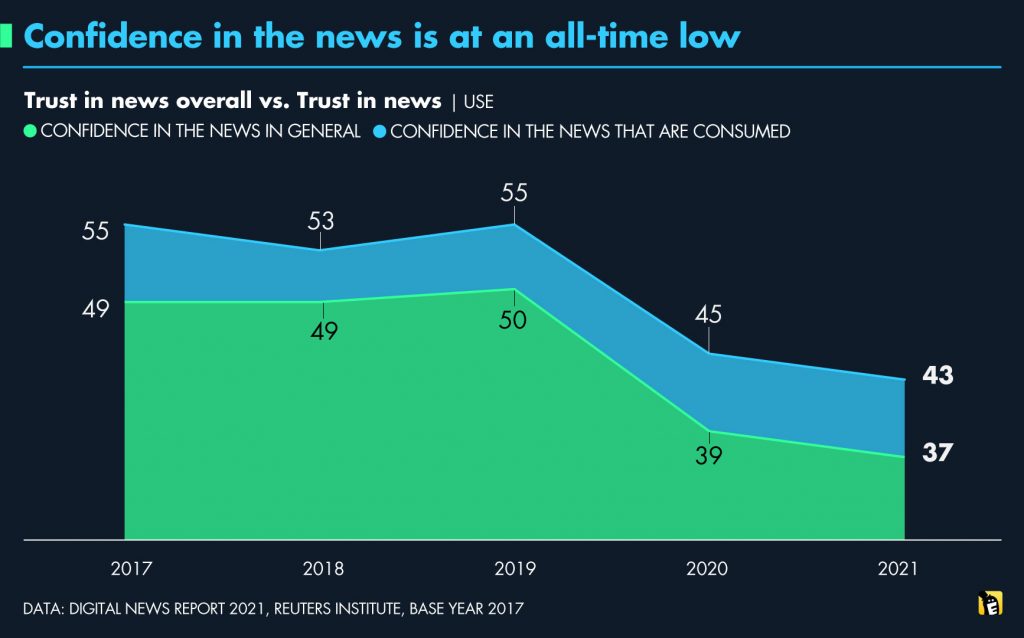
I am not going to talk about the working conditions of some professionals —discredited by the public and corporate powers, in an environment of fake news and post-truth stories and in a hyper-dynamic and hyper-demanding sector, required to attend to issues that often have nothing to do with the journalistic work.
The new ecosystem is based on new communication personalities, not precisely journalists, with different codes from the traditional ones, distributed by platforms and technological systems usually managed by third parties. Many of us who migrated from analog to digital tend to analyze this phenomenon with the tools of the past, without understanding that we are facing something totally new and of unknown consequences.
But if there is something that remains it’s that journalism is a public service and must be carried out with humane, explanatory, fact-checked and contextual ways. It is the main work of our trade and it is the key to overcome adversity and regain trust and regain a place in our communities.
I started with the bad news, perhaps motivated by my professional training, but I did it with the intention of supporting a forward-looking conclusion that I am advancing right now: there is room for reinvention if we listen to our readers again, if we attend to their information needs and if we think journalism as a public service.
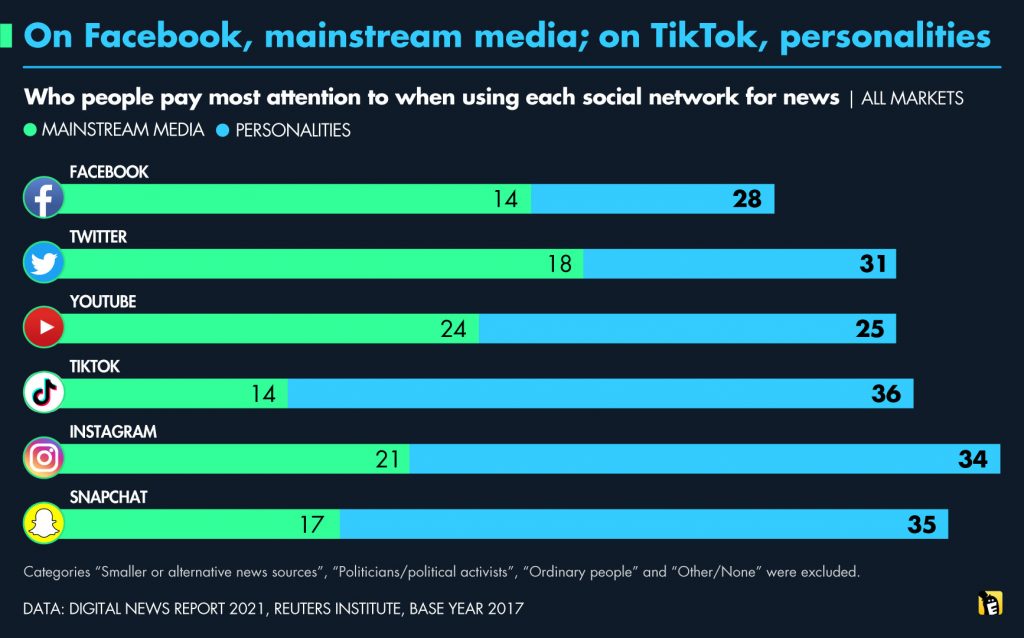
Chapter I. We broke off contact with our community
Years ago we broke off communication with the people we serve, at the same time those people embraced other formats for content and other genres of content. In my opinion, that loss of communication generated two major problems:
- We stopped explaining the reality to our readers, we broke off contact with what interests our communities, and that took its toll on us with the distancing with news consumers and a loss of confidence in our work as journalists. Our readers —our customers— slapped us.
- We stopped being the “college” of those who never went to school, as the dean of cultural journalism in México, Fernando Benítez, used to say. You must understand that I live in a poor country: OECD estimates that 8 out of 10 Mexican adults do not have higher education studies. The pandemic caused almost a million people to join the group with educational social deprivation between 2020 and 2021.
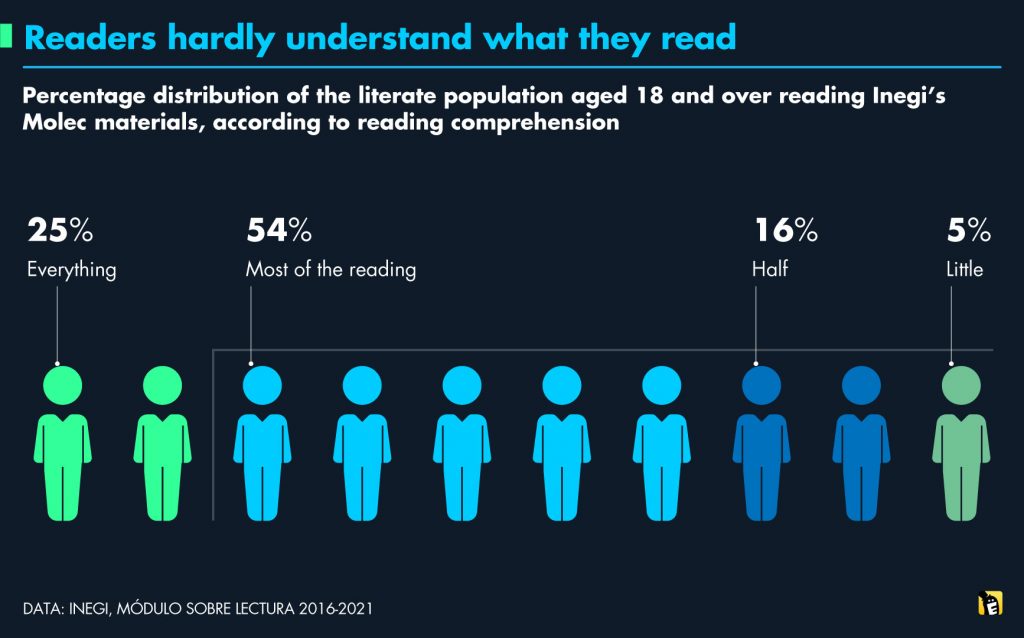
At best, we became the newspaper denounced by David Simon, journalist and creator of the television series The Wire. I quote:
«Baltimore’s surviving newspaper spent the last two decades reducing its staff and content, and concentrating its remaining resources on the petty frauds of “impact” journalism and the journalistic prize culture. They actually did abandon comprehensive coverage of the city and now miss nearly every story that actually matters to the life of Baltimore».
David Simon, journalist and creator of the television series The Wire
Instead of doing journalism that helps to understand our communities and our World or to change people’s lives, we did everything to break off with our community. We stopped humanizing, explaining, contextualizing, fact-checking. We turned our readers into audiences, into market segments —and never into a community. Not everything is lost, there are plenty of possibilities to rebuild and do things with quality, transparency and honesty to regain confidence.
Chapter II. Readers decided to spend their money better differently
The average salary in Mexico is 230 dollars per month, even though our GDP Per Capita says that we have individual incomes for about 700 dollars per month. Here, as in the joke, we must discount our Forbes millionaires from the average: Slim, Larrea, Salinas Pliego, Baillères, Beckam Vidal, Aramburuzabala…
Although averages are often misleading, the truth is that these figures leave little margin for consumers to spend their money and narrow the target markets of many business initiatives, even those that we would like to consider essential such as acquiring information services.
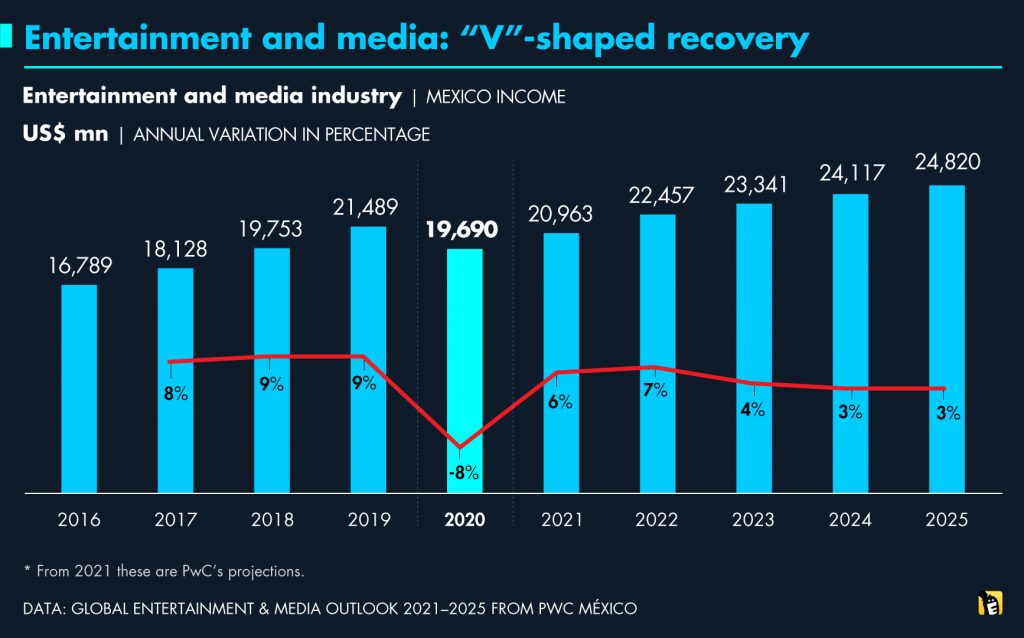
According to data from the consulting firm PwC México, the pandemic had some major implications in the media and entertainment industry:
- Restrictions on mobility to prevent the spread of coronavirus disease reduced the revenues of the industry in general by 8%. The recovery is projected as a V-shaped, but it will hardly be enough to exceed what was registered in 2018.
- Content consumption in face-to-face environments or in public spaces practically disappeared, while the activities that can be carried out at home or indoors increased substantially, such as streaming video or video games consumption.
- OTT services won pandemic, with a 24% growth in the value of their business in 2020. Victims of their own success, companies such as Netflix or Disney+ now face the challenge of the economic capacity of Mexican consumers to subscribe to their services. What the experts call: share of wallet.
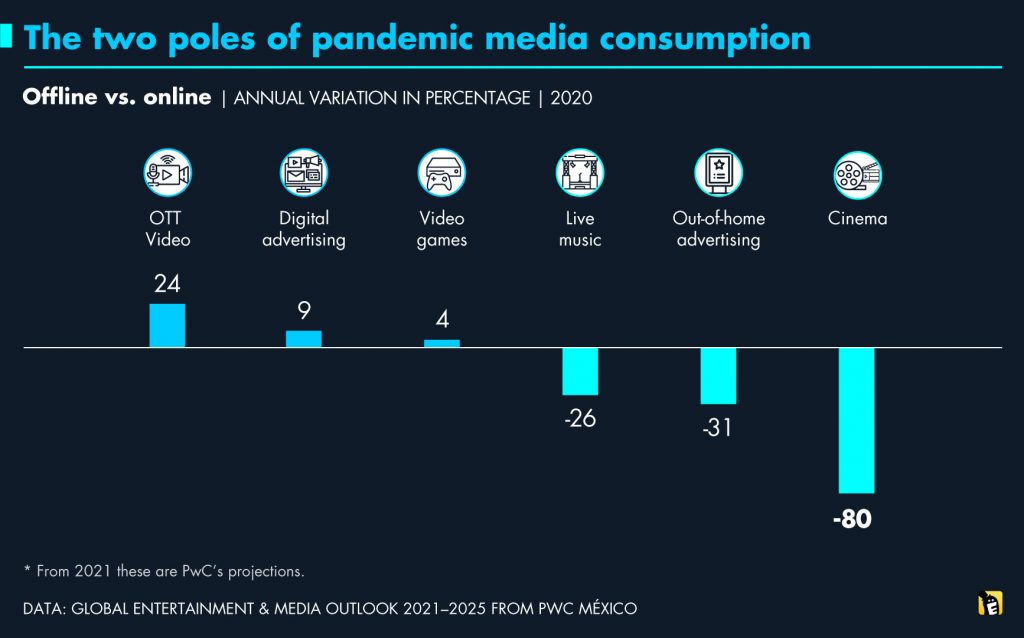

Chapter III. Digital means Google and Facebook… everything else is e-commerce
Digital channel became the one that captures the highest advertising investment. It surpassed television, the Mexican King of formats due to consumer’s socioeconomic and educational characteristics. It was a confirmation that consumption has migrated from screens.
For broadcast television, things are not very promising: it’s advertising sales will regain pre-pandemic levels in 2022 and it will take broadcast television four years to exceed them, according to projections from PwC México.
Advertising investment in digital channels represents 45% of the total, while television has a 33% share. What remains is distributed by radio, out-of-home advertising, newspapers, printed magazines and other channels.
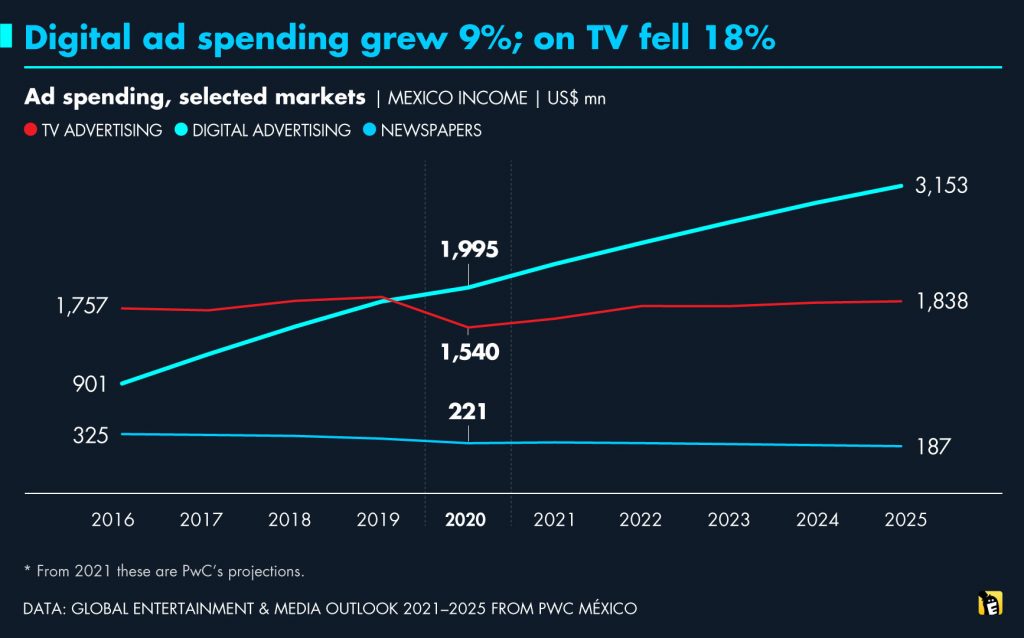
This allows me to stop at the newspaper business. In general terms, the digital business of newspapers —circulation and advertising— grows at 12% rate (CAGR, compound annual growth rate). It seems like a very good, double-digit rate, but at that rate it will take about three decades to reach the volume of the traditional business and become a backbone that can sustain the entire business.
Averages are misleading, we know, but sometimes they help to size situations.
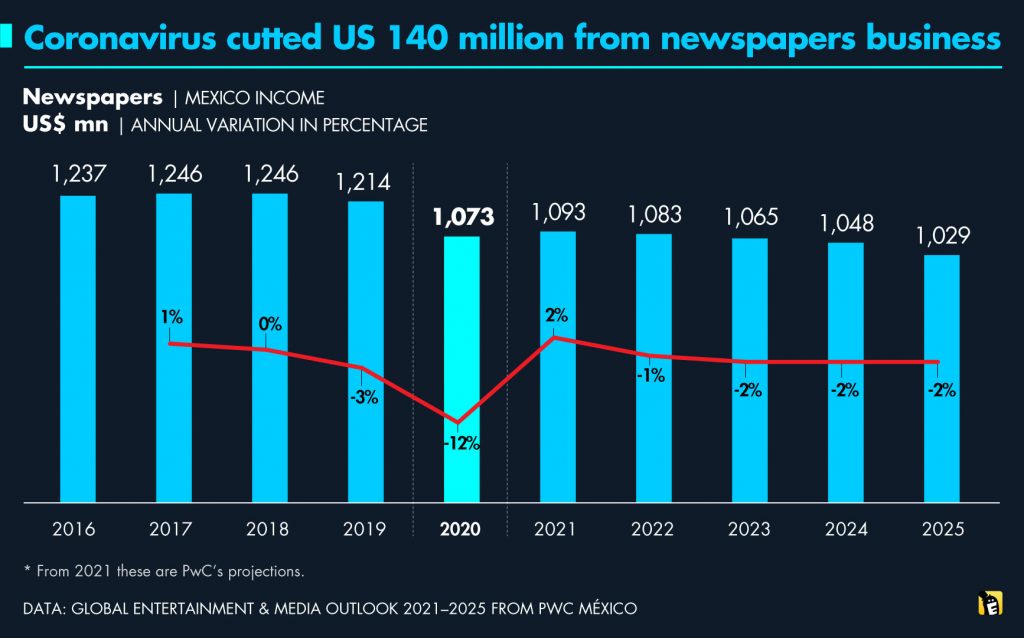
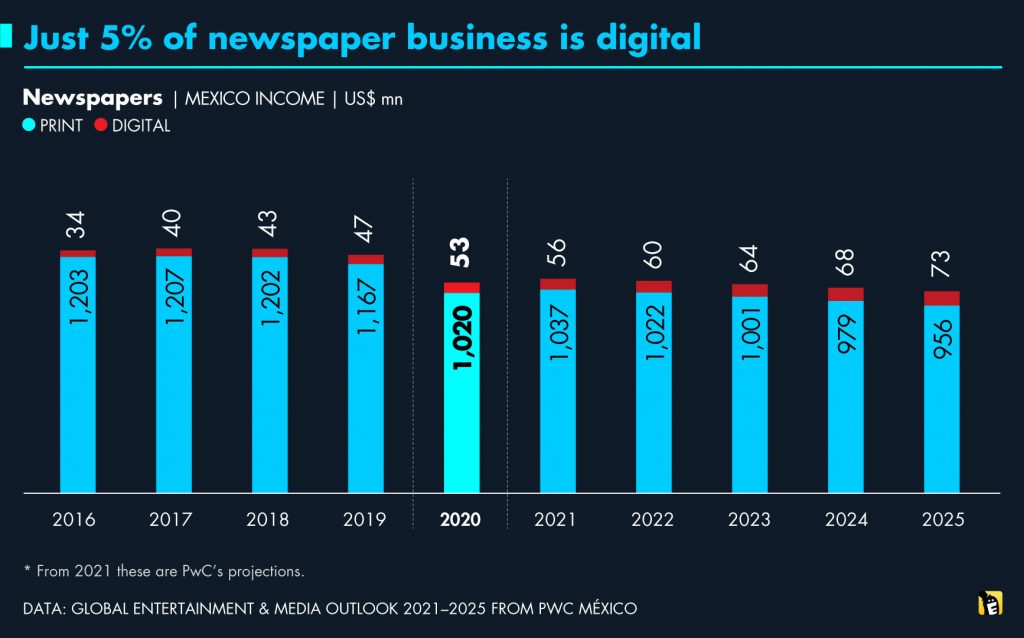
Chapter IV. News consumers are disappearing
The ecosystem is changing and is creating an ever-widening gap between an informed society and a society less interested in politics and citizenship mobilized by the understanding of the public arena.
News consumption has fallen regardless of the platform: digital channels, social networks, television and print have lost relevance as news sources. It’s a serious problem, adding to the certainty that readers are disappearing at a rate that soon there will be none left. Those who remain for the moment, however, are more interested in entertainment than in general culture or politics and public life.
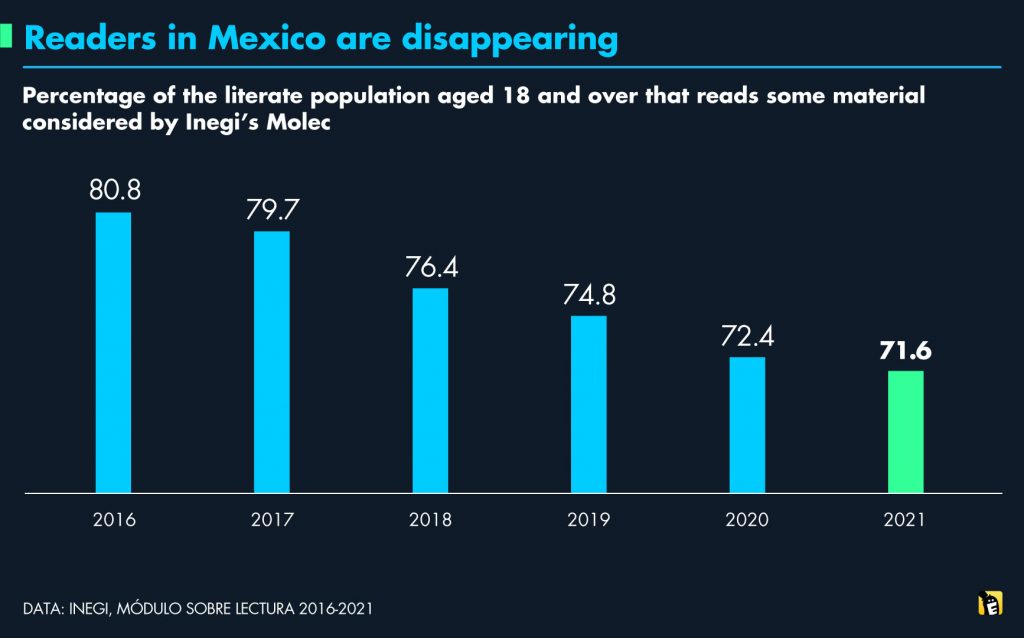
We must take action. I’m talking about consumer habits and the audience’s interests. This is a consequence, I said before, of our growing disconnection from our communities, of our failure of dialogue. And along the way we fail to do something very important for any industry: train new readers, train new consumers, such as drug dealers do when they need to engage new addicts (although this may be a politically incorrect example).
But precisely because of this, I believe that we can change the future. We can make the foundations for something different if we shake off our arrogance, if we look back at our communities and walk with them in a conversation, the basics of our journalistic job.
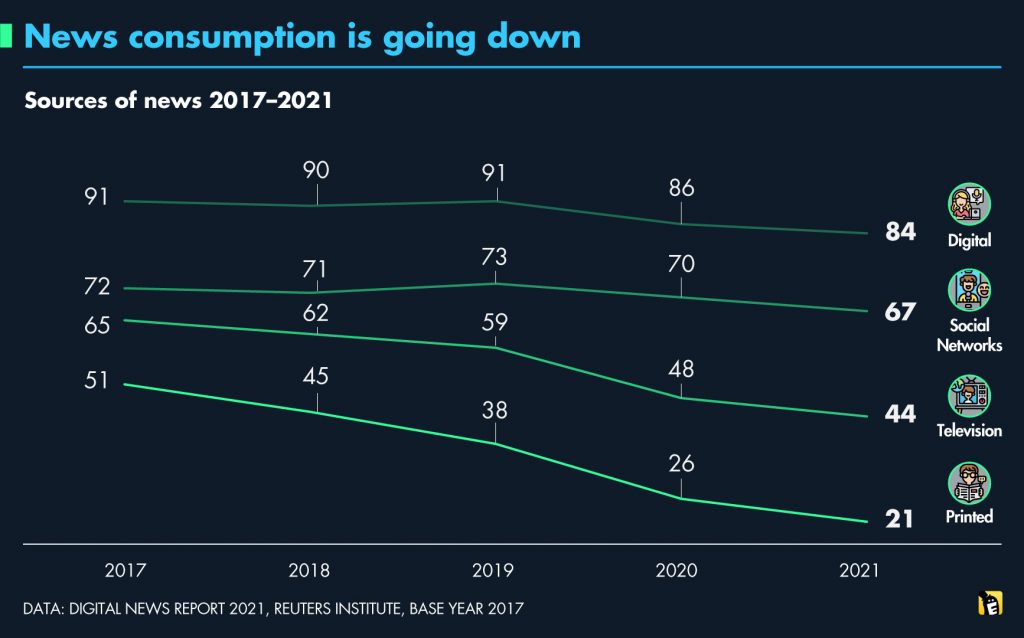
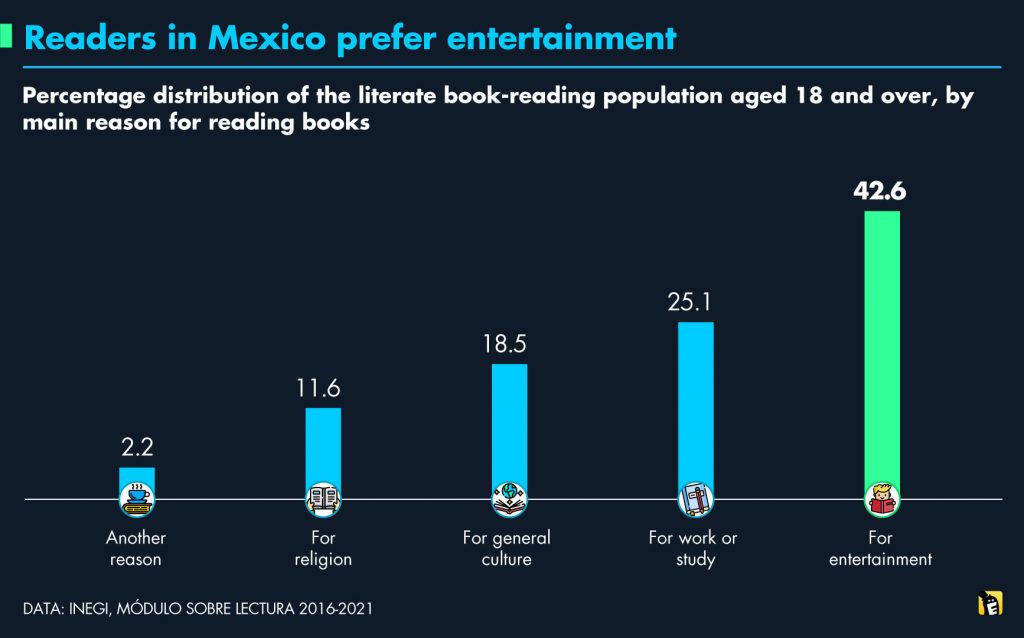
Chapter V. Accept the slap for what we stopped doing and let’s build a promising future
I am a closet optimist and I am hopeful. I believe we can change things for the good of journalism, for the good of business and for the good of our societies:
- Given the loss of confidence, readers’ reduction and loss of cognitive abilities, my proposal is to humanize, explain, contextualize and fact-check.
- Faced with the competition between the news social value and its economic value, my proposal is to look out for our communities, to stop seeing them as audiences, as market segments, and to accompany them and attend to their information needs.
- Faced with a new media ecosystem, dominated by platforms and new business models, my proposal is for quality that builds trust. We need to recover our readers based on transparency, social responsibility and integrity.
We must take action, because it is clear that soon there will be no readers who slap.
Thank you.
Suscríbete a mi newsletter sobre privacidad y sociedad de la información: economía digital, comercio electrónico, periodismo. La publico cada martes a las 6am.
Puedes darte de baja en cualquier momento dando clic en el enlace de cancelación de suscripción de mis correos electrónicos.
Acá, mi aviso de privacidad y el de Mailchimp (Intuit), el servicio que uso para el envío de newsletters.